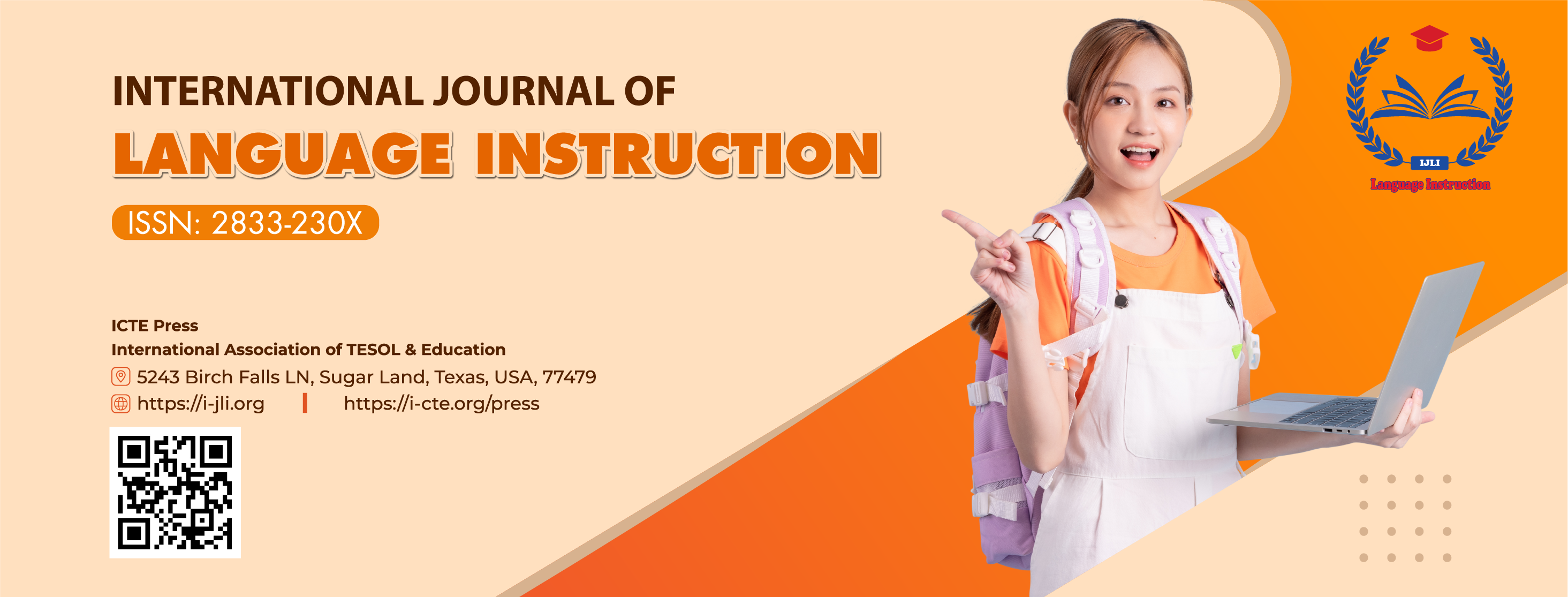Teachers’ Perceptions of Comprehensible Input on English Vocabulary Acquisition
DOI:
https://doi.org/10.54855/ijli.221110Abstract
This study aims at exploring the teacher's perceptions about comprehensible input on English vocabulary acquisition, their knowledge about it, and the ways they provide it in the classroom. The participants are 10 teachers of English who are teaching General English at a university in the Mekong Delta. A questionnaire was used to collect data from the teachers. The results indicate that the teacher's knowledge of Krashen's hypothesis is quite good. Even though some teachers are unfamiliar with the Input Hypothesis, they still place much value on comprehensible input based on their own teaching experience. However, to raise the quality of teaching English, all the teachers should expand their knowledge and improve their professional development. Krashen’s Hypothesis about comprehensible input should be spread more widely in the education field.
References
Barcroft, J. (2004). Second language vocabulary acquisition: A lexical input processing approach. Foreign Language Annals, 37(2), 200–208.
Carroll, J. B. (1971). Development of native language skills beyond the early years. In C. Reed (Ed.), The learning of language (pp. 97-156). New York: Appleton-Century-Crofts.
De la Garza, B., & Harris, R. J. (2017). Acquiring foreign language vocabulary through meaningful linguistic context: Where is the limit to vocabulary learning? Journal of Psycholinguistic Research, 46(2), 395–413.
Kara, K., & Eveyik-Aydın, E. (2019). Effects of TPRS on very young learners’ vocabulary acquisition. Advances in Language and Literary Studies, 10(1), 135–146.
Krashen, S. (1977) The Monitor Model for adult second language performance. In M. Burt, H. Dulay, and M Finocchiaro (Eds.), Viewpoints on English as a Second Language. New York: Regents, (pp.152-161).
Krashen, S. (1980). The input hypothesis. In J. Alatis (Ed.), Current issues in bilingual education (pp. 144-158). Washington, DC: Georgetown University Press.
Krashen, S. D. (1982). Principles and practice. Learning, 46(2), 327–369.
Krashen, S. (1983). Newmark's "Ignorance Hypothesis" and current second language acquisition theory. In S. Gass & L. Selinker (Eds.), Language transfer in language learning (pp. 135-153). Rowley, MA: Newbury House.
Krashen, S. (1985). The input hypothesis: Issues and implications. London: Longman.
Krashen, S. (1989). We acquire vocabulary and spelling by reading: Additional evidence for the input hypothesis. The Modern Language Journal, 73(4), 440–464.
Krashen, S. (1992). The input hypothesis: An update. In J. Alatis (Ed.), Georgetown University Round Table on Languages and Linguistics, 1991. Washington, DC: Georgetown University Press, (pp. 409-431).
Long, M. (1980). Input, interaction, and second language acquisition. Unpublished doctoral dissertation, University of California, Los Angeles.
Long, M. (1983). Linguistic and conversational adjustments to non-native speakers. Studies in Second Language Acquisition, 5,177-193.
Long, M. (1985). Input and second language acquisition theory. In S. Gass & C. Madden (Eds.), Input in second language acquisition (pp. 377-393). Rowley, MA: Newbury House.
Loschky, L. (1994). Comprehensible input and second language acquisition: What is the relationship? Studies in Second Language Acquisition, 16(3), 303–323.
Luan, N. L., & Sappathy, S. M. (2011). L2 Vocabulary Acquisition: The Impact of Negotiated Interaction. GEMA Online Journal of Language Studies, 11(2), 5–20.
Maleki, Z., & Pazhakh, A. (2012). The Effects of Pre Modified Input, Interactionally Modified Input, and Modified Output on EFL Learners’ Comprehension of New Vocabularies. International Journal of Higher Education, 1(1), 128–137.
McKeown, M. G., & Curtis, M. E. (2014). The nature of vocabulary acquisition. Psychology Press.
Medina, S. L. (1990). The effects of music upon second language vocabulary acquisition. Annual Meeting of the Teachers of English to Speakers of Other Languages, San Francisco, CA.
Mushait, S., & Mohsen, M. A. (2019). Is Listening Comprehension a Comprehensible Input for L2 Vocabulary Acquisition? International Journal of English Linguistics, 9(6), 76–84.
Nguyen, T. T. H. (2022). The Effects of Reading Habits on Writing Performance: A Case Study at Van Lang University. International Journal of TESOL & Education, 2(4), 105-133. DOI: https://doi.org/10.54855/ijte.22247
Nguyen, T, T, N. (2022). The effects of task-based instruction on reading comprehension of nonEnglish major students at Tra Vinh University in the Mekong Delta. International Journal of TESOL & Education, 2(4), 1-20. DOI: https://doi.org/10.54855/ijte.22241
Okebukola, F. O. (2004). Reading: Key to lifelong development. A keynote address delivered at the workshop on readership promotion campaign organized by the National Library of Nigeria, Lagos.
Pajares, M.F. (1993). Teachers’ beliefs and educational research: Cleaning up a messy construct. Review of Educational Research, 62(3), 307–332.
Patrick, R. (2019). Comprehensible Input and Krashen’s theory. Journal of Classics Teaching, 20(39), 37–44.
Pigada, M., & Schmitt, N. (2006). Vocabulary acquisition from extensive reading: A case study. Reading in a Foreign Language, 18(1), 1–28.
Ponniah, J. (2011). The Effectiveness of the Comprehension Hypothesis: A Review on the Current Research on Incidental Vocabulary Acquisition. Journal on English Language Teaching, 1(2), 1–4.
Rodrigo, V., Krashen, S., & Gribbons, B. (2004). The effectiveness of two comprehensible-input approaches to foreign language instruction at the intermediate level. System, 32(1), 53–60.
Tekmen, E. A. F., & Daloǧlu, A. (2006). An investigation of incidental vocabulary acquisition in relation to learner proficiency level and word frequency. Foreign Language Annals, 39(2), 220–243.
White, L. (1987). Against comprehensible input: The input hypothesis and the development of second-language Competence1. Applied Linguistics, 8(2), 95–110.
Wilkins, D. (1972). Linguistics in language teaching. London: Arnold.
Wong, C. Y. (2012). A Case Study of College Level Second Language Teachers’ Perceptions and Implementations of Communicative Language Teaching. Professional Educator, 36 (2). Published by European Centre for Research Training and Development UK (www.eajournals.org)
Downloads
Published
Issue
Section
License
Copyright (c) 2022 Thach Thi Dieu Linh

This work is licensed under a Creative Commons Attribution-NonCommercial 4.0 International License.
The copyright of all articles published in the International Journal of Language Instruction (ijli) remains with the Authors, i.e. Authors retain full ownership of their article. Permitted third-party reuse of the open access articles is defined by the applicable Creative Commons (CC) end-user license which is accepted by the Authors upon submission of their paper. All articles in the ijli are published under the CC BY-NC 4.0 license, meaning that end users can freely share an article (i.e. copy and redistribute the material in any medium or format) and adapt it (i.e. remix, transform and build upon the material) on the condition that proper attribution is given (i.e. appropriate credit, a link to the applicable license and an indication if any changes were made; all in such a way that does not suggest that the licensor endorses the user or the use) and the material is only used for non-commercial purposes.
Authors are able to enter into separate, additional contractual arrangements for the non-exclusive distribution of the journal's published version of the work (e.g., post it to an institutional repository, in a journal or publish it in a book), with an acknowledgment of its initial publication in this journal.











